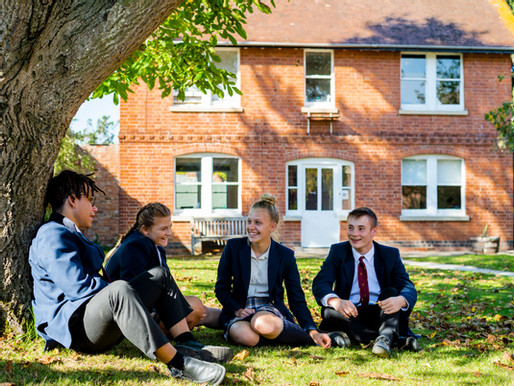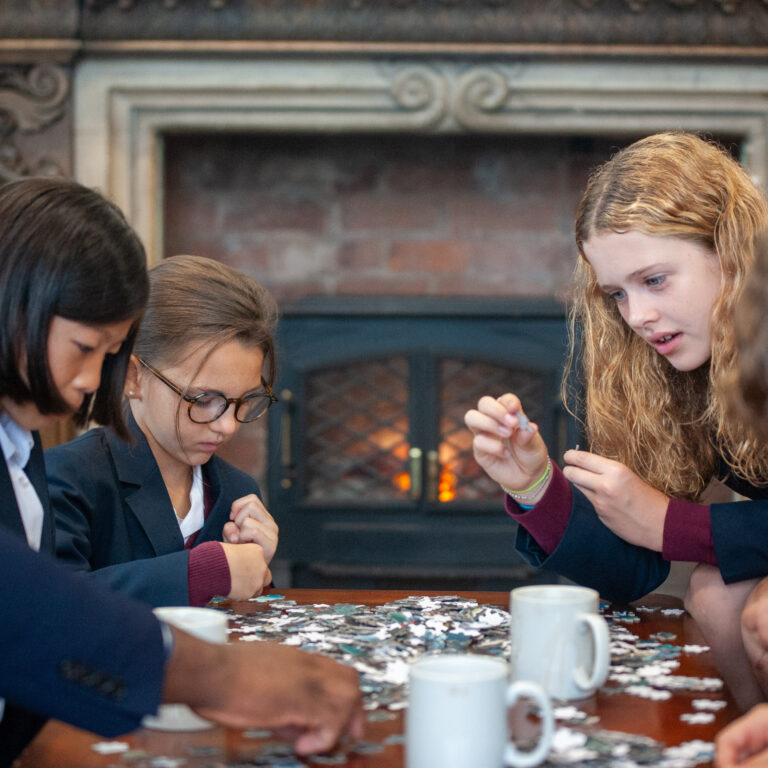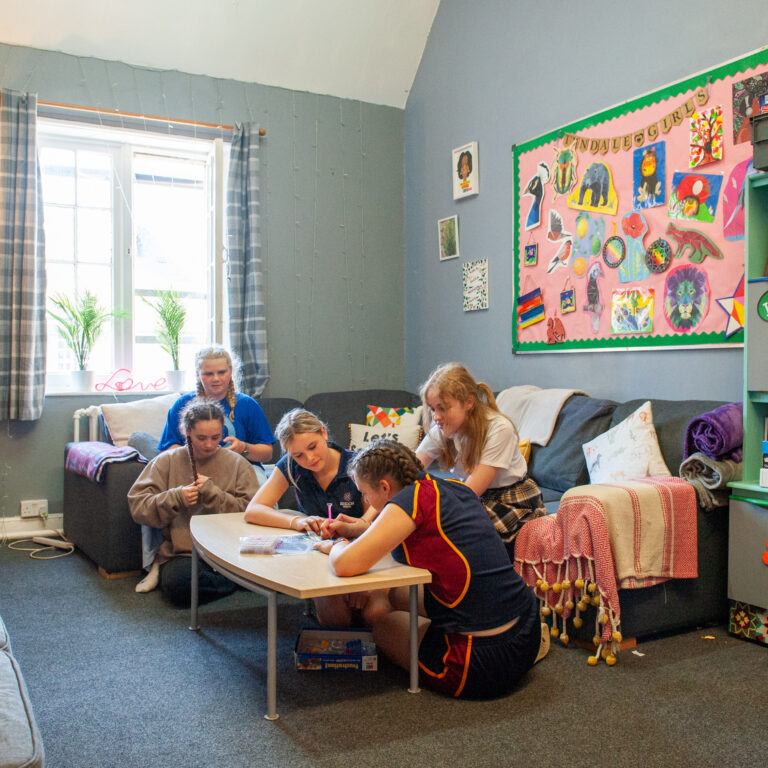This week is Mental Health Awareness Week, so we asked our expert in the school Health Centre for advice on how to stay mentally healthy during lockdown. Here are 10 top tips from our school nurse, Mrs Blakeney!
1. Spend some time outdoors.
This might be incredibly obvious, but you might be thinking that if you go out then you need to be frantically exercising. Not necessarily! Different parts of our brains are activated in the outdoors that reduce stress and spread calmness and even just sitting in an outside space can be beneficial. Lie under a tree and practice some mindfulness, sit on a park bench and read, or listen to some private music. Try and zone out! Wander around the garden, do a scavenger hunt or have a picnic. Grab the weather whilst it’s sunny, buy or make some treats, and have an al-fresco meal, or a BBQ. A water fight, or camp out? Sleep on a trampoline? There are a lot of benefits of spending time on the other side of your front or back door.
-
It improves your mood
-
It helps you take time out and feel more relaxed
-
It improves your physical health
-
It improves your confidence and self-esteem
Useful Link – Mind: How Nature Benefits Mental Health (Opens in New Tab)
2. Get a good sleep
It really doesn’t have to be all night, but quality is important! The most common factors that can affect our sleep are too much light, noise and temperature. If you regularly struggle to sleep, keep a diary and see what you can identify as being the cause of not sleeping. For me it’s too much on my mind and the cat! I can help this by writing things down (or making an audio note on my phone) and trying to not let the cat sleep on the bed! If you find yourself wide awake – get up, have a drink, go to the bathroom, take some slow deep breaths and start again. Think about bed linen, too warm or too thin? Weighted blankets? Screen time is frowned upon as the blue screen effect reduces the production of melatonin, which helps you to fall asleep and stay asleep. Audio books can be helpful if there is no screen involved! A guided meditation can really help to slow right down.
The recommended amount of sleep for adults is 7-9 hours, 10-11 for Junior School aged pupils and 9-10 for Senior School aged pupils. Think about planning a new, calming bedtime routine and try it for a week.
Interesting fact – Pythons sleep for up to 18 hours a day. Giraffes generally sleep for less than two…
Useful Link – NHS: How to Get to Sleep
Useful Link – NHS: Understanding Sleep Problems
Useful Link – Mental Health Foundation: How to Sleep Better
3. Eating well.
There are obvious deficiencies that can cause fatigue and low moods but there is also a move to include nutritional questions in mental health assessments as the link between diet and mental health becomes stronger. A study conducted by Stranges et al. (2014), in England, found that high vegetable consumption was associated with high levels of mental wellbeing. The behaviour most consistently associated with both low and high mental wellbeing was the individual’s fruit and vegetable consumption. Try to include excellent hydration skills in this tip too – at least 8 big glasses of water or squash.
Grumpiness in my children can often be a sign that food is needed, as dopiness can often be a sign of dehydration.
Did you know? Oysters are an amazing source of omega 3 and apparently only have 10 calories per oyster. However, an acquired taste…!
Useful Link – Mental Health Foundation: Mental Health and Nutrition
4. Exercise!
As simple as walking up the road! GP’s now prescribe exercise as treatment for mild depression such are the benefits. It makes you feel good! And if it doesn’t, change the activity! Choose your exercise (limited slightly at the moment I appreciate) – walk, run, cycle, wild swimming (the rivers and lakes are open – there might be local organised sessions. Try it! ) skipping, swingball, football, tennis (on elastic if no court), badminton, ping pong on the dining room table, basketball hoops in parks, disco dancing to very loud or headphone music, tree climbing, the brilliant Joe Wicks, and of course PE session ideas suggested by Miss Lea, Miss Mladek, and Mr Keyte.
Useful Link – Exercises you can do without going anywhere!
Useful Link – Mind: Physical Activity and Your Mental Health
5. Be kind – to yourself and to others.
The Mental Health Foundation conducted a survey that found that being kind to others made two thirds of us feel better about ourselves. Doing something as simple as helping someone with a task, phoning a relative, or saying thank you to someone. There have even been scientific studies into the effects of kindness, showing that acts of kindness help your immune system, reduce stress, give you energy and are good for your heart! Kindness has been proven to slow aging, and improve relationships.
Start a random act of kindness jar? The feel good factor associated with doing something nice for someone is caused by the release of oxytocin, which helps to lower our blood pressure, increase our self esteem and optimism! Plus stimulating endorphins that lower our stress levels and pain receptors. Genius!
Here is a BBC newsround link about the amazing benefits of being kind. See the next tip regarding “happy” hormones!
6. Happy hormones:
Certain hormones are known to help promote positive feelings, including happiness. They are all triggered by sunshine, exercise, and the amazing benefits of being kind. These “happy hormones” include:
-
Dopamine. This is a hormone and neurotransmitter that’s an important part of your brain’s reward system. Dopamine is associated with learning, memory, and motor system function.
-
Serotonin. This hormone (and neurotransmitter) helps regulate your mood as well as your sleep, appetite, digestion, learning ability, and memory. It calms you down and improves your mood.
-
Oxytocin, sometimes called the “kindness” hormone can help promote trust, empathy, and bonding in relationships, and oxytocin levels generally increase with physical affection or following acts of kindness. It can improve your self esteem and confidence.
-
Endorphins. Endorphins are the body’s natural pain reliever, which your body produces in response to stress or discomfort. Endorphin levels also tend to increase when you engage in reward-producing activities, such as eating or working out. Laughing, big huge belly laughs, can also release endorphins!
7. Talking
Seize opportunities for little chats , or coordinate a conversation , or any way it fits, over the dinner table? Side by side conversations during a walk for instance, can be easier than face to face. I know that if you wade in with a “tell me your concerns” this won’t work. Try chatting about neutral topics and see what comes out. For example talk about past holidays, or school trips, or birthday parties, what do you miss most during lockdown? Who would you like to visit as soon as lock down is lifted?
Here is a link to 100 questions you can ask a teenager, but adaptable to any age.
A concern or a misconception can pop out at any time, and once it’s out it is essentially shared and can be soothed. Chatting with friends, especially at the moment, can be incredibly therapeutic, but younger students may need help with this. It may be necessary to set ground rules beforehand. There are online counsellors available too, plus we have a lovely school counsellor called Jane, from Teens in Crisis, who can call or video chat.
Another amazing resource comes from our brilliant SALT team (Speech and Language Therapy). Their website has lots of resources about different ways to communicate, and practical solutions for helping manage Coronavirus anxiety. They will also design a bespoke resource if a language or conversation need arises.
8. A routine or timetable ⏰
Try to keep a routine, even loosely, as to how the day will run. You might want a weekday routine and a weekend routine. Maybe have 2 meals where everyone is together and one where people can eat outside or in their own space or informally. Build hand washing into your routine!
Exercise or go outside at a similar time each day. Do an activity at a set time. Get up and go to bed at a similar time each day (try to aim for 7-9 hours sleep, 10+ for juniors) An R&R session could be part of the day too for everyone in the household. A consistent routine can be very comforting for all of us.

9. It’s ok to not be ok.
Think of a niggling physical injury like a joint pain. It’s not necessarily painful all the time, even though you’re aware it’s there. But some days it’s really bad and you don’t even want to get out of bed. But the next day you can, and that’s the thing. It’s ok. Good days and bad days. Try to remember there will always be a good day! If you are suffering from anxiety or depression or any type of mental illness it is no less valid than a physical ailment, and it will affect you sometimes more, sometimes less. And it still fully deserves you to look after yourself, which is ok. A meltdown can be a necessary release. Crying is a recognised stress relief activity.
It’s absolutely ok to not be ok.
10. Coronavirus worries
Change, disruption, uncertainty, adjustments, lack of routine, lack of structure, fear of germs – this is a minefield for any family to navigate,even with the most optimistic mental health, let alone families with members that are neuro diverse and may have physical health needs too. Dyslexia can cause difficulties processing information. What is obvious to me, is often not at all obvious to my oldest son! If we stress how easily the virus can be spread and then say it’s ok to go to work or shopping in the presence of strangers, this can be a complete mystery of contradiction. Dyspraxia can cause anxiety and low self esteem, couple this with someone on the news talking about the number of deaths, unemployment, debt and someone suggesting bleach might help. If someone in the family is vulnerable, this is a whole world of worry. Missing friends, missing school, no fixed plans, no one knows…it’s all immensely difficult and very stressful.
Useful Link – Child Mind Institute: Autism and the Coronavirus
Useful Link – Supporting Children and Young People with Worries About COVID-19
Finally, I would like to end with a hearty meal, shared virtually with me by one of our school parents who is also a mental health nurse.
Cheers and optimism to everyone!

Click here to read more about the healthy platter.
If any of our school community would like to get in touch, please feel free to contact me anytime at nurses@bredonschool.co.uk.





